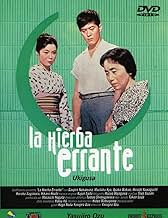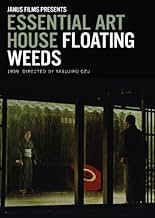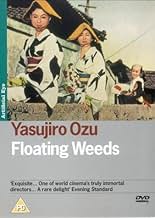VALUTAZIONE IMDb
7,9/10
9522
LA TUA VALUTAZIONE
Aggiungi una trama nella tua linguaThe head of a Japanese theatre troupe returns to a small coastal town where he left a son who thinks he is his uncle, and tries to make up for the lost time, but his current mistress grows j... Leggi tuttoThe head of a Japanese theatre troupe returns to a small coastal town where he left a son who thinks he is his uncle, and tries to make up for the lost time, but his current mistress grows jealous.The head of a Japanese theatre troupe returns to a small coastal town where he left a son who thinks he is his uncle, and tries to make up for the lost time, but his current mistress grows jealous.
- Regia
- Sceneggiatura
- Star
Recensioni in evidenza
Ozu is a wonderful experience just to watch the musical formations. Each shot is composed in the most careful way so that the assembly has a geometric rhythm. It is soft and melodic, this visual overlay, painting in motion. No one does it better that I know.
There's a talk between two troubled lovers in the rain, then in opposing shelters, that is especially noteworthy, but it is all so cinematically lovely...
The way he's put this together is very Japanese. Each shot length is nearly precisely the length of the one before. Each employs a stationary camera only, but the positioning of the camera only sometimes is where a human eye would be. As I've mentioned, The composition in terms of elements, space and color is perfect in each shot and follows in a deliberate, engineered pattern from the previous shots.
The narrative isn't integrated in the way Kurosawa would do — and be considered un-Japanese for. But the story does much of that for us.
It is a story about pretense and staging, with most of the actors playing characters who are actors and have trouble in being an actor.
You'll have to work to be engaged in the story. But its rather easy to just sit back and admire the loveliness. Ozu is always worth it for this. I don't know many of his films, but this is the most formal of those I know.
Ted's Evaluation -- 3 of 3: Worth watching.
There's a talk between two troubled lovers in the rain, then in opposing shelters, that is especially noteworthy, but it is all so cinematically lovely...
The way he's put this together is very Japanese. Each shot length is nearly precisely the length of the one before. Each employs a stationary camera only, but the positioning of the camera only sometimes is where a human eye would be. As I've mentioned, The composition in terms of elements, space and color is perfect in each shot and follows in a deliberate, engineered pattern from the previous shots.
The narrative isn't integrated in the way Kurosawa would do — and be considered un-Japanese for. But the story does much of that for us.
It is a story about pretense and staging, with most of the actors playing characters who are actors and have trouble in being an actor.
You'll have to work to be engaged in the story. But its rather easy to just sit back and admire the loveliness. Ozu is always worth it for this. I don't know many of his films, but this is the most formal of those I know.
Ted's Evaluation -- 3 of 3: Worth watching.
An itinerant troupe of Kabuki players bring their shows to the small town in which their leader Komajuro (Nakamura Ganjiro II) sired a son (Kiyoshi, Hiroshi Kawaguchi) from whom he has hidden his parentage. This beautifully made film is Yasujiro Ozu's 'remake' of his 1934 silent (A Story of Floating Weeds). Like all of Ozu's films, little happens as his static camera catches vignettes of the various shabby players as they try to hustle up an audience for their dated show, hit on the local girls (in several amusing scenes), and drink. Much of the story is about Komajuro's reconnecting with Oyoshi (Haruko Sugimura), the mother of his son and the jealous reactions of Sumiko, Machiko Kyo, his current mistress. Like all of Ozu's films, the drifting apart of generations is a focus as Komajuro struggles to ensure that Kiyoshi will go to university and not be destined to live the same life as his parents or the members of the troupe. Like the original, the story and the 'feel' is poignant and melancholy (although there are some comical moments, I missed the scenes in the silent version in which the little boy with the errant bladder plays a dog when the troupe is on stage). Watched with English subtitles.
I wrote this after I saw my first Ozu's film, "Tokyo Story" about a year ago: "As with every great work, the film has its own unique perfection in style, rhythm, details, and artist's vision - but Tokyo Story is very universal in its appeal, simply put, it is for every parent, every son or daughter - for everyone. It was made 50 years ago in Japan, about people who lived far away, but it is also about all of us, our families, our problems, our guilt and our search for love and meaning. Ozu's film does not require one to be a movie buff or to try to solve complex symbolism to appreciate and love it. It brings smiles because it is a comedy (for at least the first 2/3) and sadness with a high drama of the last 1/3 of the film."
I feel absolutely the same about "Floating Weeds". The film is quiet and deceptively simple but its simplicity reminded me the words of Michelangelo Buanorotti. When asked how he created the perfect statues from the shapeless marble lumps, he answered, "It is very simple, you just cut off all unnecessary pieces".
Ozu's films are perfect - they touch us with rare warmth, soft enveloping tenderness and power of human emotions not necessarily with striking visual or sound effects. "Floating Weeds" is a remake of earlier silent black and white Ozu's film "The Story of Floating Weeds". The story is simple: an aging, traveling actor who is the manager of a kabuki troupe returns to a remote village where he secretly meets his former lover and her 19 year old illegitimate son, to whom he is known as "uncle." The older man finds happiness in communicating with his son who turned to be a fine young man. His current mistress, filled with jealousy because of his attachment to his secret family, hires a young beautiful girl, the member of a troupe to seduce a boy. Something in this story attracted Ozu so much that he remade the film twenty five years later.
"Floating Weeds" is a beautiful color film and it is the first color Ozu's film for me. The colors are bright and fresh, tender and kind - they match the director's style perfectly. The delightful music by Kojun Saito reminds me of Nina Rota music in Fellini's films - nostalgic, innocent and rhythmic.
I feel absolutely the same about "Floating Weeds". The film is quiet and deceptively simple but its simplicity reminded me the words of Michelangelo Buanorotti. When asked how he created the perfect statues from the shapeless marble lumps, he answered, "It is very simple, you just cut off all unnecessary pieces".
Ozu's films are perfect - they touch us with rare warmth, soft enveloping tenderness and power of human emotions not necessarily with striking visual or sound effects. "Floating Weeds" is a remake of earlier silent black and white Ozu's film "The Story of Floating Weeds". The story is simple: an aging, traveling actor who is the manager of a kabuki troupe returns to a remote village where he secretly meets his former lover and her 19 year old illegitimate son, to whom he is known as "uncle." The older man finds happiness in communicating with his son who turned to be a fine young man. His current mistress, filled with jealousy because of his attachment to his secret family, hires a young beautiful girl, the member of a troupe to seduce a boy. Something in this story attracted Ozu so much that he remade the film twenty five years later.
"Floating Weeds" is a beautiful color film and it is the first color Ozu's film for me. The colors are bright and fresh, tender and kind - they match the director's style perfectly. The delightful music by Kojun Saito reminds me of Nina Rota music in Fellini's films - nostalgic, innocent and rhythmic.
... aren't we all, their lives steadily unravelling as their audience shrinks, their relationships stretched with secrets, revenge and deception coming to the fore. A poetic observation of life that turns the seemingly ordinary into something quite the opposite and, as relevant today as it has always been, as it encourages you to reflect on who you really are or have been, where you've come from and, more importantly, where you might be going.
While seemingly rather simple, "Floating Weeds" is quite a satisfying film that combines Ozu's usual thoughtful tone with characters and atmosphere convincing enough that they almost immediately make you feel as if you know both the principals and their surroundings. Much of the running time is spent on apparently routine activities, but each scene serves a useful purpose in developing the themes, settings, and characters.
The story ties together the fortunes of a traveling troupe of kabuki actors with, in the forefront, a crucial point in the relationships of Komajuro, their leader. The setting in a seaside village offers a suitably languid atmosphere that sets off both plot lines very appropriately. One of the things that is so interesting about Ozu's films is that the settings are so definitively Japanese, with plenty of well-conceived details, and yet the way that he approaches the story and characters makes his movies seem universal, confined neither by time nor place.
The characters here are an interesting assortment of theatrical types and villagers. Many of them are relatively one-dimensional, but they are portrayed with skill and sensitivity, making even the simplest of them seem worth knowing. Especially good is Machiko Kyô as Sumiko, who is also the most interesting of the characters. Ganjiro Nakamura is good too as Komajuro, but Kyô usually gets the best of their scenes together.
Two particularly good scenes between the two are the tense dispute in the rain and the encounter in the train station. In the former scene, Ozu's setup for the scene is a perfect complement for the characters' dialogue and actions. In the latter, the characters convey deep feelings with the most economical and satisfying of means.
This is the kind of movie for which subsequent viewings might even be more enjoyable than the first, in the way that coming back to a familiar place can give you an odd sense of peace or security. And it leaves you with the feeling that it would be nice to come back again sometime.
The story ties together the fortunes of a traveling troupe of kabuki actors with, in the forefront, a crucial point in the relationships of Komajuro, their leader. The setting in a seaside village offers a suitably languid atmosphere that sets off both plot lines very appropriately. One of the things that is so interesting about Ozu's films is that the settings are so definitively Japanese, with plenty of well-conceived details, and yet the way that he approaches the story and characters makes his movies seem universal, confined neither by time nor place.
The characters here are an interesting assortment of theatrical types and villagers. Many of them are relatively one-dimensional, but they are portrayed with skill and sensitivity, making even the simplest of them seem worth knowing. Especially good is Machiko Kyô as Sumiko, who is also the most interesting of the characters. Ganjiro Nakamura is good too as Komajuro, but Kyô usually gets the best of their scenes together.
Two particularly good scenes between the two are the tense dispute in the rain and the encounter in the train station. In the former scene, Ozu's setup for the scene is a perfect complement for the characters' dialogue and actions. In the latter, the characters convey deep feelings with the most economical and satisfying of means.
This is the kind of movie for which subsequent viewings might even be more enjoyable than the first, in the way that coming back to a familiar place can give you an odd sense of peace or security. And it leaves you with the feeling that it would be nice to come back again sometime.
Lo sapevi?
- QuizStated by cinematographer Kazuo Miyagawa about director Yasujirô Ozu: "I'll never forget that, from the first day on, he knew the names of everybody on the set, fifty people in the crew, people he'd never worked with. He'd written their names down, I learned later. But everyone was impressed and became devoted to him. Every single day working on this film was extremely pleasurable and enriching. In each of Ozu's films you can sniff his personality. He was pure, gentle, light-hearted, a fine individual."
- BlooperNear the end, sandals disappear or move around: after Kiyoshi argues with his father, he runs upstairs, first slipping out of his sandals and leaving them at the bottom (center) of the stairs. Moments later, Kayo goes up to him. We see that she, too, removes her sandals at the bottom of the stairs. But Kiyoshi's sandals have now suddenly disappeared: we see only Kayo's sandals at the bottom of the stairs. Moments later, Kiyoshi comes back downstairs to go after his father. He goes to put on his sandals, which have now suddenly reappeared, but in a different location from where he took them off. A moment later, Kayo also comes down the stairs and puts on her sandals, which are approximately where she had removed them and placed them, moments earlier.
- Citazioni
Komajuro Arashi: You can't help an empty house, when it's empty.
- ConnessioniFeatured in Siskel & Ebert Holiday Gift Guide (1989)
- Colonne sonoreWasurecha iyayo (aka: Don't forget me)
Composed by Yoshikatsu Hoshoda
Sang by the play troupe on a ship
I più visti
Accedi per valutare e creare un elenco di titoli salvati per ottenere consigli personalizzati
- How long is Floating Weeds?Powered by Alexa
Dettagli
- Tempo di esecuzione
- 1h 59min(119 min)
- Proporzioni
- 1.37 : 1
Contribuisci a questa pagina
Suggerisci una modifica o aggiungi i contenuti mancanti






















